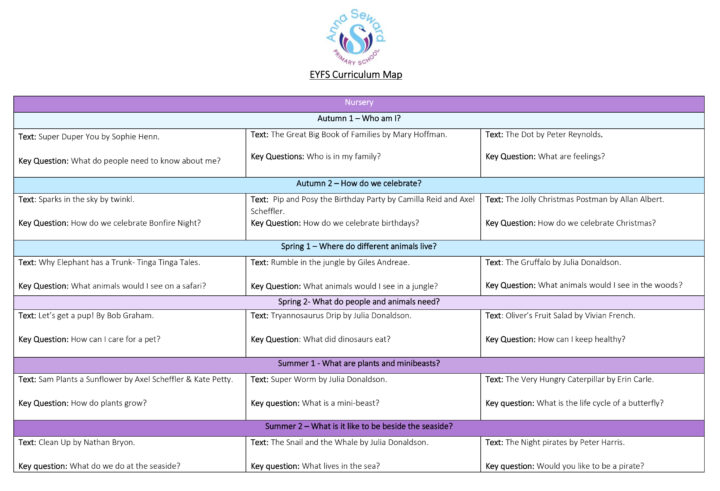Curriculum
Anna Seward Nursery provides a broad and balanced curriculum designed to develop the whole child. Young children learn by first-hand experiences of doing, touching and seeing for themselves through play. Their intellectual, social, emotional, creative and physical development will be catered for by various play activities which we offer at nursery. We plan activities across the seven areas of learning to ensure each child receives engaging opportunities both indoors and outdoors.
Children are within the FOUNDATION STAGE of their education which runs from birth and continues until the end of the reception year in primary school. The document “The Early Years Foundation Stage” forms the basis for education from birth to five. It sets out the correct ratios and welfare requirements, as well as Early Learning Goals.
The Early Years Foundation Stage identifies characteristics of effective learning:
Playing and exploring – engagement
- Finding out and exploring
- Playing with what they know
- Being willing to ‘have a go’
Active learning – motivation
- Being involved and concentrating
- Keeping trying
- Enjoying and achieving what they set out to do
Creating and thinking critically – thinking
- Having their own ideas
- Making links
- Choosing ways to do things
There are three prime areas of learning, and these are:
1. Communication and Language
This encompasses listening, attention and understanding, as well as speaking. Language development is vitally important as it forms part of the basis for all learning and influences later success. Good language skills are a pre-requisite of reading and writing. We want children to have good attention and listening skills so that they can learn individually and in a group. We want them to understand what is being said to them and follow instructions. It is important for children to be able to communicate their needs and express themselves. We want children to enjoy communicating and learning new words. At our nursery we place a great emphasis on playing with the children, getting to know them and helping them to develop their language skills by talking with them at their own level then extending. Staff are very well trained in language development.
2. Personal, Social and Emotional Development
This area involves self-regulation, managing self and building relationships. There is a focus on developing self-confidence and self-awareness, managing feelings and behaviour, as well as on making relationships. This is another crucial area of learning and influences how the child feels about themselves and how they learn. Children need to be confident in making choices, doing a variety of activities and concentrating on task. It is also concerned with how your child interacts with other children and adults, learning to share and play co-operatively in small groups and occasionally larger ones. They need to be able to express and control their emotions, to develop respect and consideration for other people’s needs. It is also about your child’s ability to look after themselves for example going to the toilet, putting on coats etc. In the nursery, each child has a key worker which supports strong, warm, supportive relationships.
3. Physical Development
This covers gross motor and fine motor development. Gross motor skills are developed sometimes inside but mostly outside where children are encouraged to play with large equipment to exercise their muscles. Children have the opportunity and are encouraged to run freely, climb, skip, jump and learn to balance on equipment. This helps to develop self-confidence and self-awareness. Small PE equipment for example hoops, bats, balls, bean bags encourage co-ordination and skill acquisition. Fine manipulative skills are developed with construction toys, jigsaws, threading and use of small tools e.g. scissors. Children need to be able to manipulate and control small items to enable them to use a pencil and then make shapes and later on, letters and numbers.
Then there are four specific areas of learning, which come after the prime:
- Literacy
- Mathematics
- Understanding the World
- Expressive Arts and Design

Canva

